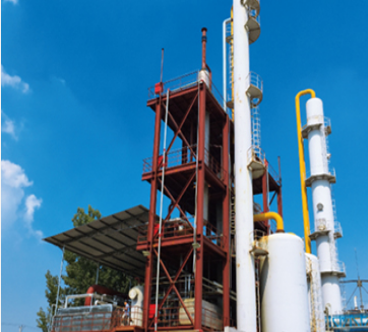欢迎进入山东恒能环保能源设备有限公司
欢迎进入山东恒能环保能源设备有限公司
生物法烟气脱硫技术未来研究方向
Future research directions of biological flue gas desulfurization technology
发展微生物烟气脱硫技术很具有潜力, 但也存在一些问题需要解决, 应侧重以下几方面的研究工作:
The development of microbial flue gas desulfurization technology has great potential, but there are also some problems that need to be solved, and research work should focus on the following aspects:
基础理论研究。氧化无机硫的菌种以专性、兼性自养菌为主, 而专性自养菌往往生长较慢, 在烟气脱硫技术中, 生物量的供应将影响整个系统的处理效率。因此, 在今后的研究中, 筛选生长速度快、脱硫性能优良的菌种是必须进行的基础研究。对已有的菌种, 应将研究放在微生物培养方案优化和对微生物菌种的改良上, 改进微生物的遗传性状, 提高菌种的脱硫效率。同时, 进一步探索烟气脱硫机理, 从而提出更合理的脱硫新方法, 以指导和完善脱硫技术, 加快工业化进程。
Basic theoretical research. The bacterial species that oxidize inorganic sulfur are mainly specialized and facultative autotrophic bacteria, and specialized autotrophic bacteria often grow slowly. In flue gas desulfurization technology, the supply of biomass will affect the treatment efficiency of the entire system. Therefore, in future research, screening strains with fast growth rate and excellent desulfurization performance is a necessary basic research. For existing bacterial strains, research should focus on optimizing the optimal microbial culture plan and improving microbial strains, improving their genetic traits, and enhancing their desulfurization efficiency. At the same time, further explore the mechanism of flue gas desulfurization, and propose more reasonable new desulfurization methods to guide and improve desulfurization technology, and accelerate the industrialization process.
选择合适的生物反应器。生物反应器涉及气、液、固三相传质及生化降解过程, 影响因素多而复杂, 有关的理论研究及实际应用还不够深入, 需要进一步探讨和研究。
Choose a suitable bioreactor. Bioreactors involve three-phase mass transfer and biochemical degradation processes of gas, liquid, and solid, with multiple and complex influencing factors. Theoretical research and practical applications are not yet in-depth enough, and further exploration and research are needed.
合理解决烟气温度较高和生物法脱硫常温操作二者之间的矛盾。燃煤锅炉烟气经除尘器后温度一般较高,而脱硫细菌多在常温下生长, 因此, 一方面应开发回收利用进入生物反应器前烟气余热的技术; 另一方面, 应用分子生物学技术, 培育更适于烟气脱硫的耐高温的脱硫菌。

Reasonably resolve the contradiction between high flue gas temperature and normal temperature operation of biological desulfurization. The temperature of coal-fired boiler flue gas after passing through the dust collector is generally high, and desulfurization bacteria mostly grow at room temperature. Therefore, on the one hand, technology should be developed to recover and utilize the waste heat of flue gas before entering the bioreactor; On the other hand, molecular biology techniques should be applied to cultivate high-temperature resistant desulfurization bacteria that are more suitable for flue gas desulfurization.
功能菌的选育。随着生物技术的高速发展, 利用现代基因工程技术对某些脱硫菌进行改性, 强化其转化作用, 以获得生长繁殖速度快、活性高、适应温度和氢离子浓度指数范围宽的多质粒菌, 筛选和培育出适应性和稳定性更高的脱硫菌, 通过缩短烟气脱硫菌的驯化、培育和挂膜时间延长脱硫菌的使用寿命。
Breeding of efficient functional bacteria. With the rapid development of biotechnology, modern genetic engineering technology is used to modify certain desulfurization bacteria and enhance their transformation, in order to obtain multi plasmid efficient bacteria with fast growth and reproduction speed, high activity, wide adaptability to temperature and hydrogen ion concentration index range, screen and cultivate desulfurization bacteria with higher adaptability and stability, and extend the service life of desulfurization bacteria by shortening the domestication, cultivation, and membrane hanging time of flue gas desulfurization bacteria.
随着生物技术的不断发展, 微生物烟气脱硫技术必将取得更大进展。
With the continuous development of biotechnology, microbial flue gas desulfurization technology is bound to make greater progress.
本文由 生物脱硫 为您精心提供,如想了解更多请点击我们的网站:http://www.fcw-app.com,我们将会以的热情为您解答!
This article is carefully provided by biological desulfurization for you. If you want to learn more, please click on our website: http://www.fcw-app.com We will answer you with the greatest enthusiasm!